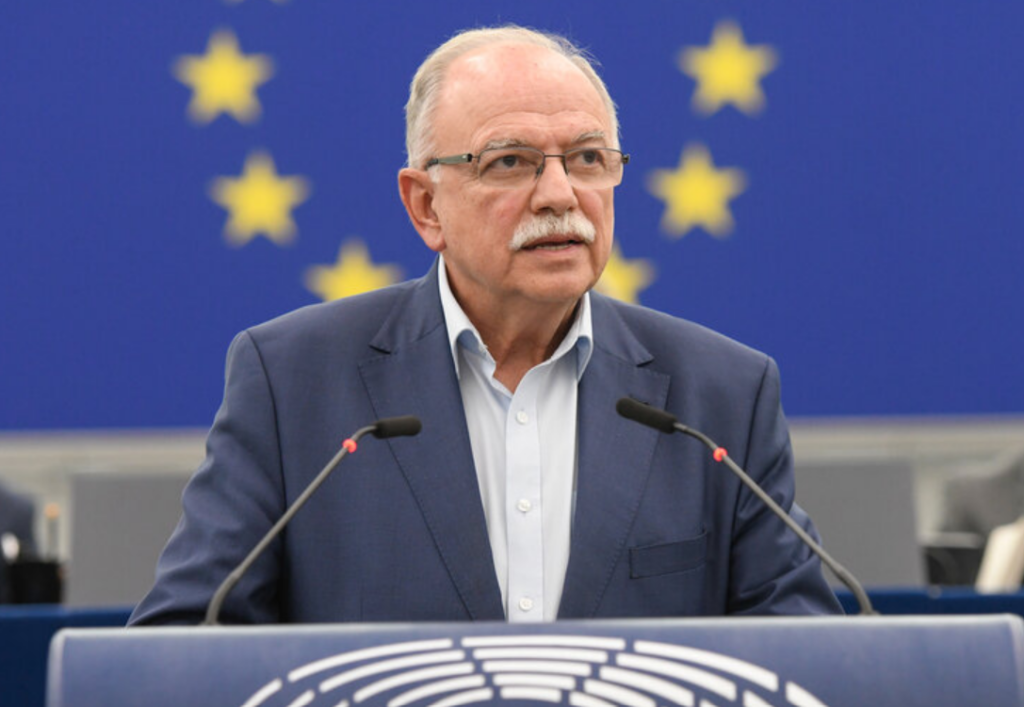A senior European official has suggested that the so-called Qatargate scandal is "only the tip of the iceberg" of more deeply entrenched European corruption, and claimed that the illicit funds uncovered thus far by Belgian investigators in connection with the affair were likely used "only for tips".
In a wide-ranging interview with The Brussels Times, Greek Vice-President of the European Parliament and Head of the Syriza Delegation Dimitrios Papadimoulis also stated that he had profound "moral concerns" about Greek MEP Eva Kaili (S&D) — one of the figures at the very centre of the scandal — prior to her election as fellow Vice-President of the European Parliament.
Last December, Belgian investigators found €150,000 in Kaili's apartment, while her father was caught leaving a luxury hotel in downtown Brussels with a suitcase filled with a similar amount in cash.
"I think we're only seeing the tip of the iceberg," Papadimoulis said. "We don't yet know how much money was used to buy influence in more modern ways. The money in suitcases was probably used only for tips, to buy some additional influence."
He added: "I'm not a detective and I'm not a judge, but I think there is zero chance — absolutely zero chance — that the Qataris and the Moroccans and the Mauritanians would decide to buy influence by trying only to invest in the second biggest party [the Socialists & Democrats] in the European Parliament, which is the weakest European institution. Based on common sense, there is still a lot of work to be done by the Belgian authorities."
Smelling corruption
As a veteran EU politician who was first elected to the European Parliament almost two decades ago and who has been serving as Vice-President since 2014, Papadimoulis noted that he has developed a keen ability to "smell" when a European official — whether it be Kaili or anyone else — has been unduly influenced by one of Brussels' numerous lobbying groups.
"Sometimes I see phenomenon like a colleague who is, let's say, not so active, not so well prepared in meetings in their respective committees," Papadimoulis recounted. "However, when it is time to have an important report related to the future of cars or pharmaceuticals or the crypto industry or whatever, they have a perfect presentation, with an excellent speech, and well-prepared amendments."
"It could be a miracle, or it could be something else," he added.
However, Papadimoulis explained that he had particular reasons to be concerned about Kaili and her ties to various lobbying and private interest groups. "I had a lot of doubts about her moral behaviour — to put it in a politically correct way," he said, adding that he had even attempted to warn the S&D group against nominating her as Vice-President.
"I didn't know anything about Qatargate, and I didn't see suitcases, but I knew a lot of things about her relations with Greek oligarchs," he said.
'A lot of fears'
Nevertheless, Papadimoulis was adamant that he took no pleasure whatsoever in having his suspicions about Kaili's nefarious behaviour confirmed.
"This scandal has negative consequences for my own work as Vice-President at the Bureau of the European Parliament, for the European Parliament itself, and for my country," he said. "It has made me angry and sad. And it's especially bad for all the Greeks who are trying to improve our image against stereotypes, who are working hard, gaining respect. I certainly didn't say congratulations to myself."
Related News
- 'It reminds me of a Tintin cartoon': MEP compares Qatargate to classic Belgian comic
- Scandal at European Parliament: Fresh allegations against Tarabella revealed by Panzeri
Papadimoulis also noted his deep concern that the Qatargate scandal — as well as the growing influence of lobbying groups in Brussels and the European institutions' lack of transparency generally — would serve as grist to the mill of the anti-European populist far-right.
"In the last European elections, the rise of the anti-European extreme-right was lower than expected because there was an increase in voter participation among young people, who voted for a better, more united Europe," Papadimoulis said. "But now this scandal gives more space to the anti-European demagogic extreme-right, to people like [Hungarian Prime Minister Viktor] Orban."
"I don't know what the reaction of European citizens will be after this scandal. But I have a lot of doubts, and a lot of fears," he concluded.

